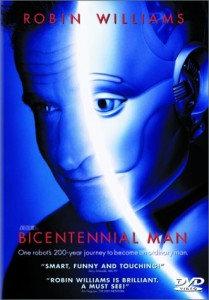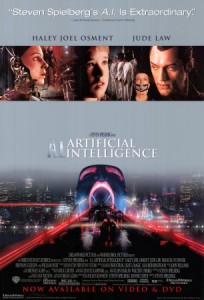Chapter 20 of our textbook outlines some very interesting concepts about artificial intelligence, such as the Turing test and the argument of strong versus weak artificial intelligence. According to the text, artificial intelligence (AI) is defined as a “special branch of computer science that investigates the extent to which the mental powers of human beings can be captured by means of machines.” Scholars in this field have been debating the potential “humanness” a machine currently possesses or will possess for the last fifty or sixty years. Proponents of weak AI claim that a computer will only ever be able to simulate a human mind, whereas proponents of strong AI claim that computers actually duplicate the mind. Turing sought to answer the question, “Can machines think?” with an experiment where a computer and an actual human response were alternatively given to an interrogator. If the interrogator was unable to consistently determine the human response, the computer, according to the test, could be said to think.
So what do you think? Will true artificial intelligence ever be realized? Is a machine’s ability to mimic human behavior or characteristics enough to classify it as a thinking being, or are there other factors that need to be considered as well? I know this is kind of random, but what about the issue of cloning (if that’s ever possible), would clones fall under the heading of natural or artificial or neither?



Josh Morrison
12:24 pm, 10.11.10
For some reason to whole notion of artificial intelligence has just never seemed even remotely likely to me. It has always seemed so far fetched and a little uninteresting. Cloning, on the other hand, is fascinating and I think would definitely be considered natural because all of the parts would be organic.
Rachel Jinkerson
12:33 pm, 10.11.10
I almost blogged about this myself because I found it very interesting that there were people in the world that believed in strong AI and thought that machines could duplicate the mind. Personally, I believe that machines and computers are only as good as their programs. They do not have consciousness and cannot generate new ideas. I think the idea of AI is very applicable to our time today though because technology expands every day and we are becoming more reliant on computers and robots.
Amy McCarty
12:35 pm, 10.11.10
I do not have well formulated, concrete ideas on this subject, but I think that there is more to humanity than the ability to think. I believe that we are complex creations enhanced by our emotions. I also think that many pursuits (Artificial intelligence, cloning, artificial insemination, etc.) could be our modern day tower of babel.
Danielle Urias
1:48 pm, 10.11.10
I have always been interested in this topic, and what started as a liking for science fiction has become a very real possibility. In terms of Al’s proposition, I am not sure how a computer would stand up to a human being. How would they measure a computer’s “humanness?” Having the ability to distinguish between the two may not be enough; perhaps more sophisticated testing methods will emerge in the future. Albeit a bit frightening, artificial intelligence is also very exciting.
In regards to cloning, to me that is a totally different subject. I don’t know how I would feel about essentially making a copy of someone. It would seem to me like playing God, but I also think man can create that which is God-willed. I’m curious to see where this issue will go in the future.
Jonathan Sanders
2:36 pm, 10.11.10
True artificial intelligence can never be accomplished. From a logistics and mathematical standpoint, I think machines can excel, but human decisions have the factor of emotion that machines could never have. Therefore, machines can never be on the same level of humans. As far as machines mimicking humans, I believe that machines will get no further than a parrot, they may be able to do some of the same things that we do, but it has no meaning behind it because they do not know the reason.